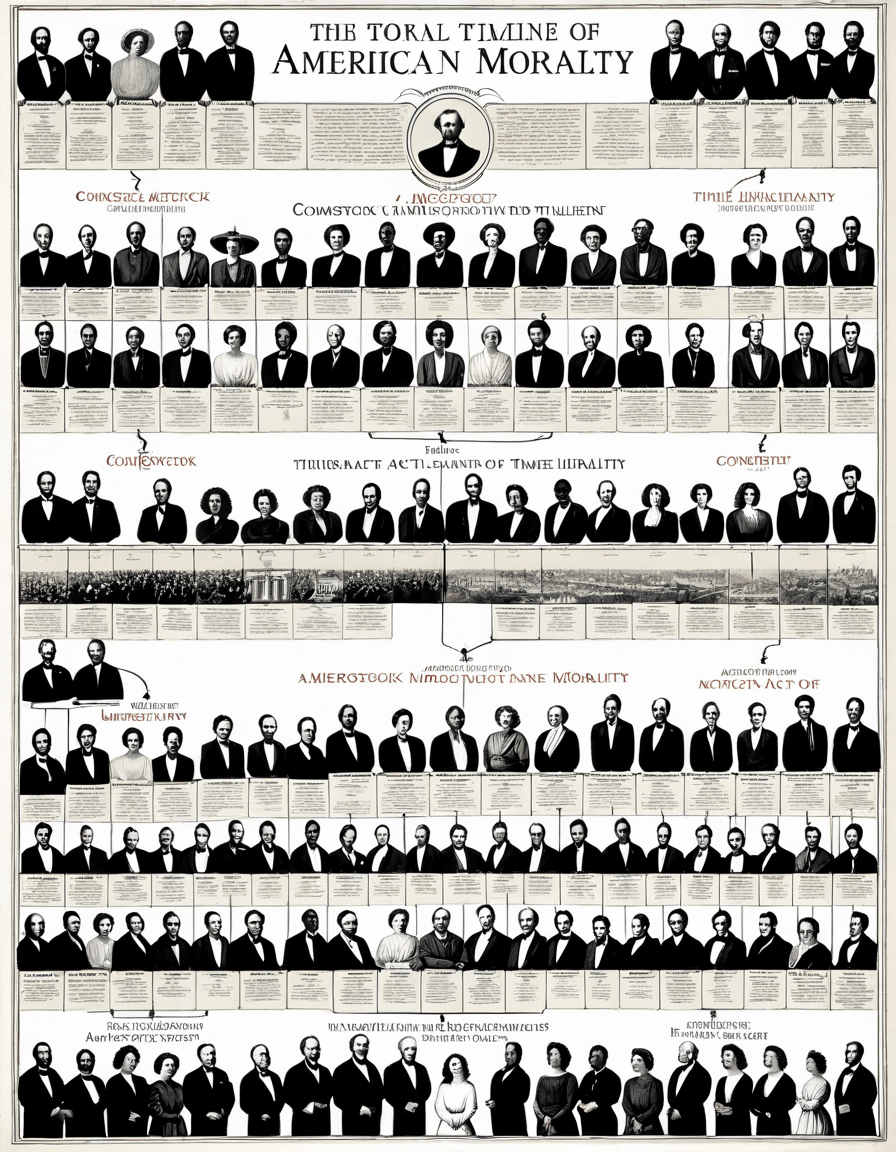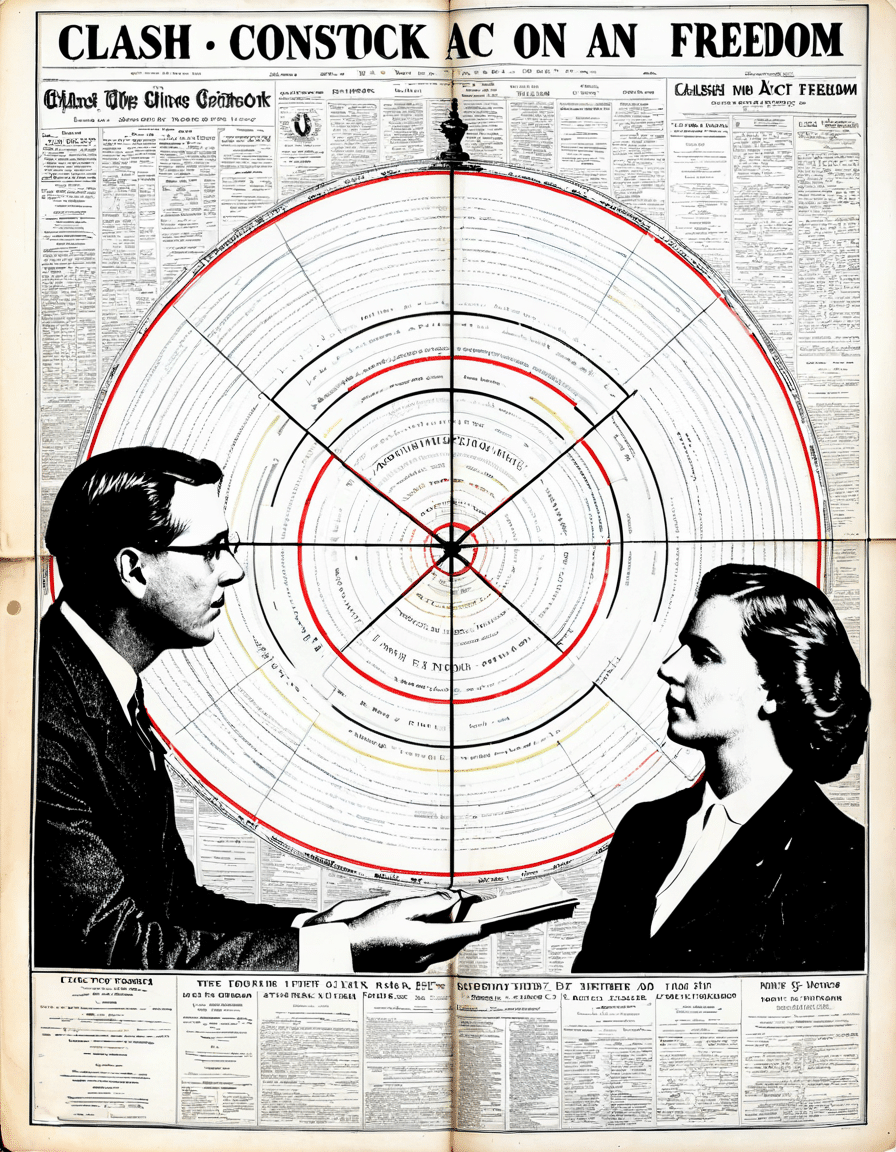1. Understanding the Comstock Act: A Historical Overview
The Comstock Act, enacted in 1873, significantly shaped American laws around morality and sexuality. Named after Anthony Comstock, a dedicated proponent of Victorian values, this piece of legislation aimed to prohibit the distribution of “obscene, lewd, or lascivious” materials. Comstock was not merely a legislator; he was a moral crusader who believed he was safeguarding the souls of the American people. His fervor led to an extensive framework of morality laws that continues to influence contemporary debates over sexual health and political correctness.
The legislation was crafted during an era marked by rapid social change—a time when new technologies like the telegraph and printing press were changing the way information spread. The fears the public held regarding obscenity and moral degradation motivated political leaders to introduce laws like the Comstock Act. Initially, it provided a strong foundation for future censorship and morality legislation, resulting in a reverberating impact that influenced American society for generations.
The Comstock Act and its accompanying ethos created a legal and cultural environment where morality was strictly defined and codified. To understand how this historical context laid the groundwork for contemporary issues, it is vital to unpack the motivations behind Comstock’s agenda and the far-reaching effects that his vision of morality had on American legal frameworks.

2. The Comstock Act’s Legacy: Five Key Impacts on Morality Laws
The reach of the Comstock Act extends far beyond its original scope of censorship; it fundamentally altered the landscape of morality laws across the nation. Let’s explore five significant impacts this legislation has had on American laws and public opinion.
2.1. The Criminalization of Birth Control
One of the most enduring consequences of the Comstock Act was the criminalization of birth control. This law catalyzed a cascade of restrictions that would stifle reproductive rights for decades. Despite growing calls for family planning options, Comstock’s legislation created formidable barriers to access. Activists like Margaret Sanger emerged as trailblazers in response, taking bold steps toward advancing not just reproductive health but also the fight for women’s rights.
The battle against these restrictions culminated in the landmark Supreme Court case, Griswold v. Connecticut (1965), which ultimately decriminalized birth control. The echoes of Comstock’s Act can still be felt today, as public discourse continues to grapple with reproductive rights and personal freedoms.
2.2. Censorship of Educational Materials
The Comstock Act took a toll on sexual health education by promoting the censorship of necessary educational materials. Many schools faced barriers to providing accurate information about human sexuality. The act’s implications extended into classrooms, where incomplete sex education became the norm, perpetuating cycles of ignorance and stigma.
This legacy remains present in today’s debates over sex education programs across the nation. Critics argue that fear-driven policies rooted in the Comstock Act still hamper students’ access to vital information, challenging their ability to make informed decisions about their own bodies.
2.3. Modern Implications for New Hampshire Child Marriage Laws
The impact of the Comstock Act can even be seen in New Hampshire child marriage laws. While the Act didn’t directly address marriage, its moralistic tone resonates in the societal attitudes that condone practices like child marriage. Recent discussions surrounding child marriage in New Hampshire reflect a growing recognition that these practices clash with modern ethical standards.
In 2024, the introduction of the New Hampshire Child Marriage Bill aimed to eliminate loopholes that allowed minors to marry. Advocacy from organizations and community leaders has gone hand-in-hand with efforts to reshape public opinion about what constitutes moral legislation in contemporary society.
2.4. The Rise of Moral Entrepreneurship
The Comstock Act not only facilitated the regulation of morality but also birthed a phenomenon known as ‘moral entrepreneurship.’ This term describes individuals or organizations that exploit legal frameworks to combat perceived immorality. Over time, movements ranging from Prohibition to today’s internet censorship debates have emerged, highlighting how individuals leverage the legacy of the Comstock Act to influence legislative action.
Organizations such as the Parents Television Council have drawn upon this legacy to advocate for more stringent media regulations, continuously shaping public policy in alignment with their moral views. The act established a precedent for how moral values can shape laws and influence public discourse.
2.5. Ongoing Debates on Obscenity Laws
Questions surrounding the definition of obscenity continue to spark intense debate today, echoing the foundational principles laid down by the Comstock Act. High-profile Supreme Court cases like Miller v. California (1973) sought to clarify the jury’s role in defining obscenity while balancing free speech rights against moral considerations.
Current discussions reflect on how today’s obscenity standards still intertwine the remnants of the Comstock Act, complicating societal values and legislative measures. As digital content and new forms of expression evolve, the challenge lies in understanding how these shifts affect perceptions of morality in the context of American law.
3. Reform Movements: Addressing Child Marriage in New Hampshire
Discussions about child marriage in New Hampshire have gained momentum in recent years. Advocacy groups such as the Coalition Against Child Marriage have worked tirelessly to reshape public perceptions around this controversial issue. Their efforts hinge on the belief that innocent minors should not be permitted to marry, considering the emotional and psychological ramifications involved.
In 2024, public support surged for the New Hampshire Child Marriage Bill, which aims to raise the minimum marriage age and ensure robust protections against coerced marriages. Through grassroots campaigns, community meetings, and public demonstrations, advocates are bringing attention to a practice that many argue contradicts the very essence of contemporary morality.
The challenges encountered in advocating for reform underscore the ongoing struggle between longstanding legal mechanisms rooted in moralism and the necessity for change anchored in modern ethics. As public sentiment shifts, the path toward reform becomes clearer, pushing for laws that align more closely with current societal norms.

4. Future Implications: The Path Forward
As America grapples with the legacies of the Comstock Act, it’s essential to foster dialogue focused on progressive legal reforms. Movements advocating for individual freedoms highlight a necessary reevaluation of outdated practices, including child marriage. Innovative initiatives are emerging that promote a more inclusive legal framework prioritizing the rights and autonomy of individuals.
This evolving moral landscape promotes acceptance and understanding rooted in compassion rather than outdated dogmas. The growing awareness around issues like child marriage signals a possible turning point, where reforms can align more closely with contemporary values.
Reflecting on the discussion surrounding the Comstock Act illuminates the intricate web of historical impacts, societal values, and the ongoing quest for moral clarity in law. Engaging with these themes not only deepens our understanding of past challenges but also lights the path toward a more equitable society where morality laws resonate with modern ethical standards.
By tackling these pervasive issues with a lens focused on reform, we can work to build a society that genuinely embodies principles of justice, equality, and compassion for all its members.
Comstock Act: Insights and Trivia
The Prohibition Influence
Did you know that the Comstock Act, passed in 1873, had a broad impact on American society? It prohibited sending obscene materials through the mail, effectively stifling conversations about birth control and sexual education. This legislation shaped public morals and standards, but it also caused a stir across various industries, including media and art. Speaking of media, just as the Comstock Act aimed to control information, today’s cultural landscape sees celebrities like Miranda Cosgrove take center stage in movies and TV shows, often reflecting societal issues.
Unintended Consequences
As folks began to push back against the Comstock Act, some surprising results emerged. For instance, the act is often credited with inadvertently sparking the sexual revolution of the 1960s! This was quite the turnaround, considering its original aim was to tighten moral standards. The idea of censorship always brings up heated debates, much like the ones seen during critical moments, including the recent house Votes that can shift the political landscape. Such discussions remind us of the ongoing tug-of-war between freedom of expression and moral governance.
The Legacy of Censorship
Fast forward to the present, the Comstock Act’s legacy continues to echo in discussions about censorship and societal limits. Much like how popular sports, such as the Nfl kickoff game, encapsulate American culture, the fallout from the Comstock Act remains a fascinating topic of engagement. With the rise of the internet and instant communication, navigating these moral laws has become even more engrossing. So, here’s a fun tidbit: did you know that Yao Ming’s height is an astounding 7 feet 6 inches? Just goes to show that in any discussion, whether it’s about towering athletes or historical legislation, there’s always room for a little fun trivia!




